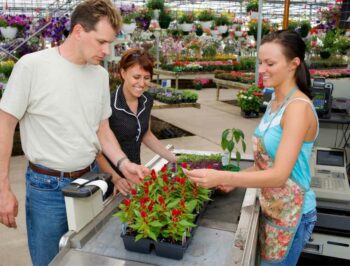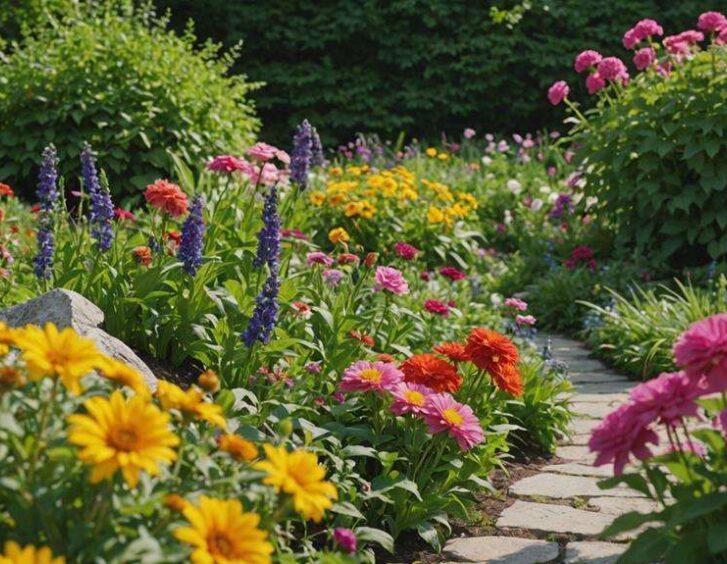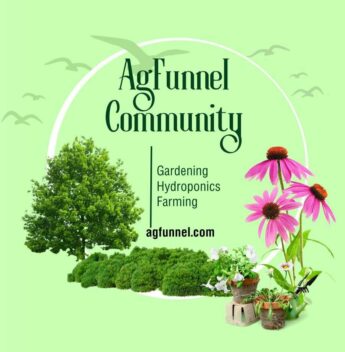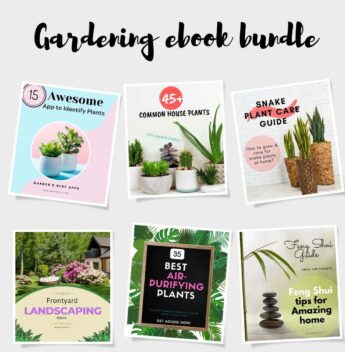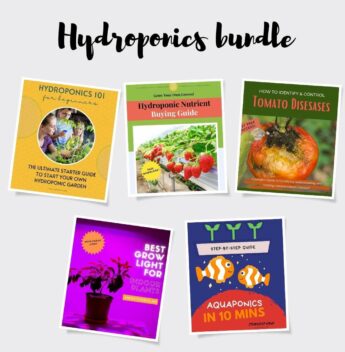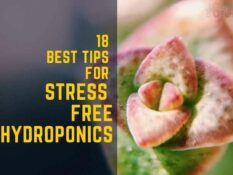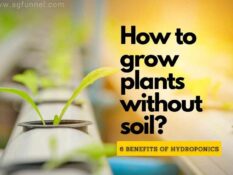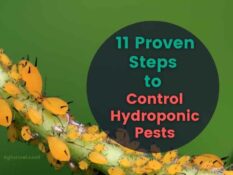To enhance your flower garden, it's crucial to grasp plant nutrition basics and the significance of fertilizers. Fertilizers replenish lost nutrients, preventing stunted growth and poor blooming. Different growth stages require specific nutrients, and adapting fertilizer types to these stages guarantees necessary nutrients. Choose the right fertilizer type based on your plants' needs, and apply it correctly to prevent over- or under-fertilizing. Proper fertilizing reveals your flowers' full potential, transforming your garden into a vibrant oasis. Delve deeper to discover the secrets to mastering fertilizing and elevate your flower garden to the next level of beauty and vitality.
Key Takeaways
• Macronutrients like NPK, secondary nutrients, and micronutrients are essential for plant growth and blooming in a flower garden.
• Fertilizers replenish lost nutrients, preventing stunted growth, pale leaves, and poor blooming, and act as food for plants.
• Adapt fertilizer types to different growth stages, using phosphorus-rich fertilizers during flowering and nitrogen-rich fertilizers during vegetative stages.
• Choose fertilizers based on plants' nutrient needs, considering growth stages and requirements for blooming flowers or leafy greens.
• Apply fertilizers correctly, following product instructions and adjusting methods based on fertilizer type to prevent over- or under-fertilizing.
Understanding Plant Nutrition Basics
To create a thriving flower garden, you need to understand the basics of plant nutrition. This involves recognizing the essential macronutrients, secondary nutrients, and micronutrients that plants require to grow and flourish.
Macronutrients like nitrogen, phosphorus, and potassium (NPK) are important for plant growth. Nitrogen promotes leaf growth, phosphorus supports root development, and potassium helps with overall health.
Secondary nutrients, including calcium, magnesium, and sulfur, also play significant roles. Micronutrients like iron, zinc, and boron are equally essential for plant health.
Understanding these nutrients will help you provide your flowers with the necessary building blocks for a healthy and vibrant garden. By recognizing these essential nutrients, you'll be well on your way to creating a beautiful and thriving flower garden.
Why Fertilizers Are Essential
What makes fertilizers a must-have for your flower garden?
As you nurture your flowers, they absorb essential nutrients from the soil. Over time, the soil's nutrient supply depletes, and your plants begin to suffer.
Fertilizers replenish these lost nutrients, ensuring your flowers receive the nourishment they need to thrive. Without fertilizers, your plants may experience stunted growth, pale leaves, and poor blooming.
By using fertilizers, you're providing your flowers with the necessary nutrients to bloom vibrantly and healthily. Think of fertilizers as food for your plants, giving them the energy to grow and flourish.
Fertilizing for Plant Growth Stages
As your flowers progress through different growth stages, you'll need to adjust your fertilizing strategy to meet their changing nutrient requirements.
During the seedling stage, your flowers need high amounts of phosphorus to promote root development.
As they enter the vegetative stage, they require more nitrogen to support leaf growth.
When they reach the flowering stage, phosphorus becomes essential again for blooming.
Adapting your fertilizer accordingly will guarantee your flowers receive the necessary nutrients.
For example, you can use a balanced fertilizer (e.g., 10-10-10 NPK) during the vegetative stage and switch to a phosphorus-rich fertilizer (e.g., 10-20-10 NPK) during the flowering stage.
Choosing the Right Fertilizer Type
How do you navigate the vast array of fertilizers on the market to find the perfect match for your flower garden? With so many options, it can be overwhelming.
First, consider the type of plants you're growing. Different plants have varying nutrient needs, so choose a fertilizer that caters to their specific requirements.
You'll also want to think about the growth stage of your plants. For example, blooming flowers require more phosphorus, while leafy greens need more nitrogen.
Additionally, decide between liquid, slow-release, or organic fertilizers, each with their own benefits and drawbacks.
Effective Fertilizer Application Tips
When fertilizing your flower garden, start by reading and following the product instructions carefully to make certain you're applying the right amount at the right time. This guarantees you're providing your plants with the necessary nutrients without over- or under-fertilizing.
Next, consider the type of fertilizer you're using - liquid, slow-release, or granular - and adjust your application method accordingly. For example, liquid fertilizers are best applied during watering, while granular ones should be worked into the soil.
Avoiding Common Fertilization Mistakes
By paying attention to your fertilization schedule and technique, you can sidestep common mistakes that might be holding your flower garden back from reaching its full potential.
One common mistake is overfertilizing, which can damage your plants and even the environment.
Another mistake isn't considering the specific needs of your plants, leading to underfertilization.
You might also be using the wrong type of fertilizer or applying it at the wrong time.
To avoid these mistakes, make sure to read and follow the instructions on the fertilizer package, and take the time to learn about the specific needs of your plants.
Signs of Underfertilization Warnings
Your plants are sending you warnings if they're not getting enough nutrients, and it's crucial to recognize these signs of underfertilization to take corrective action.
If your flowers are struggling, it may be due to a lack of essential nutrients. Stunted growth, pale or yellowing leaves, and poor blooming are all indicators that your plants need a nutrient boost. Leaves may also become smaller or more fragile, and stems may weaken.
Dangers of Overfertilization Damage
While you're busy addressing underfertilization, it's equally important to beware of overfertilization, which can be just as detrimental to your flower garden's health.
You might think more fertilizer means more blooms, but excessive nutrients can cause more harm than good. Overfertilization can lead to leaf burn, where crispy brown edges form, and crust builds up on the soil surface, preventing moisture absorption.
This can cause wilting, yellowing, and even plant death. Be mindful of the fertilizer you choose and follow the instructions carefully. Remember, it's better to start with a small amount and gradually increase as needed.
Monitor your plants closely, and adjust your fertilizing schedule accordingly. By being conscious of the dangers of overfertilization, you can ensure your flowers thrive in a healthy, balanced environment.
Preventing Soil Depletion Strategies
To maintain a thriving flower garden, regularly replenish your soil with essential nutrients to prevent depletion. Soil depletion occurs when plants absorb nutrients, and they're not replenished. This can lead to poor plant growth, weak roots, and reduced blooming.
To prevent depletion, add organic matter like compost or manure to your soil. These natural amendments enrich the soil with macronutrients like nitrogen, phosphorus, and potassium. You can also use cover crops, like legumes, which fix nitrogen in the soil.
Furthermore, rotate your flowers to avoid depleting the soil of specific nutrients. By following these strategies, you'll maintain a balanced soil ecosystem, promoting healthy plant growth and vibrant blooms.
Optimizing Fertilizer Schedules
By tailoring your fertilizer schedule to your flowers' specific needs and growth stages, you can maximize their blooming potential and overall health. Consider the type of flowers you're growing, as different varieties have unique requirements.
For instance, roses and lilacs require more frequent feeding than succulents. Create a schedule based on your climate, too - flowers in warmer regions may need more frequent fertilizing. Mark your calendar to fertilize during key growth stages, such as when buds form or during periods of rapid growth.
Frequently Asked Questions
Can I Use Household Items as Fertilizers for My Flower Garden?
Using household items as fertilizers for your flower garden requires careful consideration. Items like banana peels, eggshells, and coffee grounds are rich in nutrients and can act as natural fertilizers.
However, it's crucial to use them in moderation and balance, as overfertilization can harm your plants. Research the best ways to utilize these items, and combine them with traditional fertilizers for a thriving garden.
How Often Should I Rotate Fertilizers to Avoid Nutrient Imbalance?
You're wondering how often to rotate fertilizers to avoid nutrient imbalance.
The key is to rotate fertilizers seasonally, as different plants have varying nutrient needs throughout the year.
For example, flowering plants require more phosphorus in the spring, while summer-blooming plants need more nitrogen.
Change your fertilizer every 2-3 months to guarantee a balanced diet for your flowers.
This rotation will prevent nutrient deficiencies and promote healthy growth.
Are Organic Fertilizers More Effective Than Synthetic Ones?
You're wondering if organic fertilizers are more effective than synthetic ones. The answer is, it's not that simple. Both types have their advantages.
Organic fertilizers release nutrients slowly, promoting long-term soil health, while synthetic fertilizers provide quick results.
Organic options tend to be more environmentally friendly, but may not provide immediate gratification. Synthetic fertilizers can offer fast growth, but may harm the environment.
Consider your goals and choose the best fit for your garden.
Can I Fertilize My Flowers During Extreme Weather Conditions?
You're wondering if you can fertilize your flowers during extreme weather conditions.
The answer is, it's generally not recommended. Fertilizing during heavy rain, intense heat, or freezing temperatures can lead to nutrient loss, soil erosion, or even plant damage.
Instead, wait for more favorable conditions to fertilize your flowers, ensuring the nutrients are properly absorbed and utilized.
Is It Necessary to Fertilize Seedlings Differently Than Mature Plants?
You'll want to fertilize seedlings differently than mature plants. Seedlings have delicate roots and need gentle nurturing. Start with a balanced, water-soluble fertilizer at half the recommended strength to prevent burning.
As they grow, you can gradually increase the fertilizer dose.
Mature plants, on the other hand, require more nutrients to support blooming and fruiting. Be sure to choose a fertilizer that matches their specific needs, and follow the product instructions for application rates and timing.

